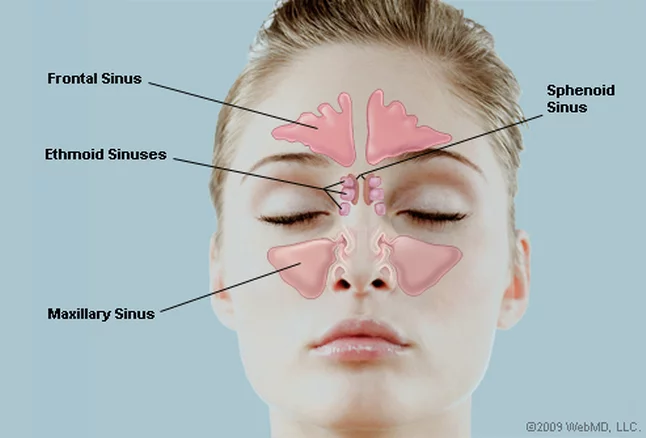Exploring the Connection Between Sinus Anatomy and Smell
The sense of smell plays a vital role in our lives, from helping us enjoy our favorite foods to alerting us to danger. But did you know that your sinuses have a major impact on how well you can detect scents? The sinuses are intricately connected to the olfactory system—the network responsible for processing smells—meaning that sinus health is closely tied to our ability to enjoy scents and detect odors. Let’s explore how sinus anatomy affects the sense of smell and why sinus infections, blockages, and other issues can cause olfactory problems.
Sinuses and Their Role
The sinuses are a network of four paired, air-filled cavities located in your skull. They include the frontal, maxillary, ethmoid, and sphenoid sinuses, each positioned around the nose, eyes, and forehead. Although their primary functions include filtering, humidifying, and warming the air we breathe, the sinuses are also closely linked to the olfactory system.
- Olfactory Epithelium: Located at the top of the nasal cavity, this small patch of specialized tissue contains olfactory receptors that detect odor molecules. The olfactory epithelium is surrounded by sinuses, which play a role in delivering odor molecules to these receptors.
- Air Flow and Smell Transmission: When you inhale, air-carrying odor molecules pass through your nasal passages and sinuses, bringing the scent to the olfactory epithelium. Healthy sinuses allow for smooth airflow, making it easier for odors to reach these receptors.
Why It Matters: Because the sinus anatomy supports airflow through the nasal passages, they play a critical role in enabling odor molecules to reach the olfactory receptors. When the sinuses are clear, the pathway for smells is unobstructed, allowing for optimal scent detection.
How Sinus Health Affects Smell Sensitivity
Healthy sinuses ensure that air flows freely and that odor molecules can reach the olfactory receptors, supporting a strong sense of smell. However, when sinus issues arise, this airflow can become disrupted, impacting your olfactory function.
- Unobstructed Airflow for Better Smell Detection: Properly functioning sinuses help to clear and condition the air you breathe. By maintaining a smooth pathway for airflow, the sinuses support efficient scent detection.
- Filtering and Cleaning Odor Molecules: Sinuses filter out pollutants, dust, and allergens, which protects the olfactory system from damage. This filtering process helps keep your olfactory receptors functioning well, allowing for accurate scent detection.
Why It Matters: Healthy sinuses contribute to a clean and efficient pathway for smells, enhancing your overall sense of smell and reducing exposure to irritants that can dull olfactory sensitivity over time.
Sense of Smell Dull Reasons
When the sinuses become inflamed, blocked, or infected, your sense of smell is often one of the first things affected. Here’s why sinus issues commonly lead to olfactory problems:
- Sinus Infections (Sinusitis): Sinusitis is the inflammation of the sinus lining, often caused by a viral or bacterial infection. The inflammation causes mucus buildup, narrowing the nasal passages and blocking airflow. With restricted airflow, fewer odor molecules reach the olfactory receptors, leading to a reduced sense of smell.
- Excess Mucus Production: In response to infection or irritation, the sinuses produce extra mucus, which can clog the nasal passages. This layer of mucus traps odor molecules, preventing them from reaching the olfactory epithelium.
- Swelling in the Nasal Cavity: Sinus inflammation often causes swelling in the nasal tissues, further narrowing the space through which odor molecules can pass. This physical obstruction reduces airflow, significantly impacting scent detection.
Why It Matters: Sinus infections and inflammation create physical barriers that block scent molecules from reaching the olfactory receptors, dulling the sense of smell until the inflammation subsides and the airways clear.
Conclusion
Your sinuses play a larger role in your sense of smell than you may realize. Healthy sinuses support airflow, filter out irritants, and help deliver odor molecules to the olfactory receptors. However, when sinus infections, inflammation, or blockages occur, they can create barriers that dull your ability to detect scents. By understanding the connection between sinus anatomy and smell and taking steps to keep your sinuses in good condition, you can help maintain a strong sense of smell. If sinus issues are affecting your sense of smell, consider consulting a healthcare provider to explore treatments that can restore olfactory function and enhance your quality of life.
FAQs
1. Can sinus infections permanently damage my sense of smell?
Most sinus infections cause temporary olfactory issues. However, untreated chronic sinusitis or repeated infections may lead to longer-term smell impairment. Seeking medical treatment early can help prevent lasting damage.
2. Why does my sense of smell return gradually after a sinus infection?
As inflammation subsides and mucus clears, airflow to the olfactory receptors is restored. This gradual recovery allows odor molecules to reach the receptors again, slowly improving your sense of smell.
3. How can nasal polyps affect my sense of smell?
Nasal polyps create physical blockages in the nasal passages, restricting airflow and reducing the number of odor molecules that reach the olfactory receptors, which dulls your sense of smell.
4. Does using a nasal spray help improve my sense of smell?
Certain nasal sprays, like saline or corticosteroid sprays, can reduce inflammation and clear mucus, potentially improving airflow and smell sensitivity. Consult a doctor before using sprays long-term.
5. Are there medical treatments for restoring smell after sinus issues?
Yes, treatments like antibiotics, corticosteroids, or surgery for structural issues (like polyps or a deviated septum) can improve airflow and restore olfactory function in many cases.





